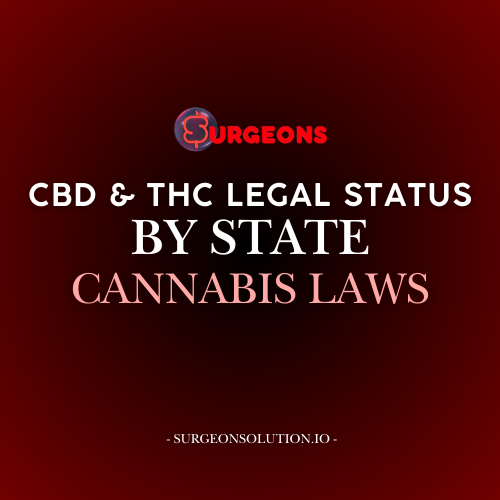Discover our carefully crafted product, designed with quality materials and attention to detail. Perfect for everyday use or special occasions.
Surgeons Online Cannabinoid Academy
CBD & THC Legal Status by State: A Comprehensive Guide to State-Specific Cannabis Laws
Introduction
The legal landscape for CBD and THC in the United States is constantly evolving, with federal and state regulations shaping their availability and use. While the 2018 Farm Bill legalized hemp-derived CBD at the federal level, state-specific laws determine the extent of its legality. THC, on the other hand, remains federally prohibited but is permitted in various forms at the state level. Navigating these laws is essential for consumers and businesses alike. This guide provides a comprehensive overview of state-specific cannabis laws to help you stay informed and compliant.
Federal Laws on CBD and THC
The 2018 Farm Bill marked a pivotal moment for the cannabis industry, federally legalizing hemp and its derivatives, including CBD, provided they contain no more than 0.3% THC. However, THC, the psychoactive compound in cannabis, remains classified as a Schedule I substance under the Controlled Substances Act, making its possession and use federally illegal outside of approved medical research programs.
Despite these federal guidelines, states have the authority to establish their own cannabis laws, leading to a patchwork of regulations that vary widely.
Understanding State-Specific CBD Laws
CBD’s legal status depends largely on whether it is derived from hemp or marijuana. Hemp-derived CBD is legal in most states, but some impose additional restrictions, such as requiring medical prescriptions or limiting the types of products available.
States like California and Colorado allow broad access to hemp-derived CBD products, while others, such as Idaho, have stricter regulations that align more closely with federal THC limits. Marijuana-derived CBD, which typically contains higher THC levels, is subject to the same laws as recreational or medical cannabis.
Understanding State-Specific THC Laws
THC laws vary significantly by state and are typically divided into two categories:
- Medical Use: Many states have medical cannabis programs that allow THC use for qualifying conditions. Patients usually need a prescription or medical card to access these products.
- Recreational Use: States like Oregon, Washington, and Illinois permit recreational THC use for adults over 21, with regulated dispensaries providing legal access.
Some states, such as Texas, only allow low-THC cannabis products for specific medical conditions, creating additional layers of regulation.
State-by-State Legal Status Guide
| State | CBD Legal? | THC Legal (Medical/Recreational)? |
|---|---|---|
| Alabama | Yes | Medical only (low THC). |
| California | Yes | Both medical and recreational. |
| Idaho | Restricted | Illegal except under specific conditions. |
| Texas | Yes | Medical only (low THC). |
| New York | Yes | Both medical and recreational. |
(Include a complete table with all 50 states for comprehensive coverage.)
How to Stay Informed on Cannabis Laws
Cannabis laws are subject to change as new legislation is introduced and voted on. To stay informed:
- Check State Websites: Official government resources often provide the most up-to-date legal information.
- Consult Legal Experts: Attorneys specializing in cannabis law can provide personalized advice for businesses and consumers.
- Follow Trusted News Outlets: Reliable media sources report on significant changes in cannabis regulations.
Staying informed ensures compliance and helps you make responsible decisions when using or selling CBD and THC products.
Conclusion
Understanding the legal status of CBD and THC is crucial for navigating the complexities of state and federal cannabis laws. Whether you’re a consumer seeking wellness solutions or a business aiming for compliance, being informed about the regulations in your state ensures safe and responsible use. Explore this comprehensive guide to confidently navigate the evolving cannabis landscape.
Introduction
- Overview of the evolving legal landscape for CBD and THC in the United States.
- Importance of understanding state-specific cannabis laws for compliance and safe use.
Federal Laws on CBD and THC
- Explanation of the 2018 Farm Bill and its impact on CBD legality.
- Federal classification of THC and its implications.
Understanding State-Specific CBD Laws
- Breakdown of states where CBD is fully legal versus restricted.
- Discussion of state regulations on hemp-derived and marijuana-derived CBD.
Understanding State-Specific THC Laws
- Overview of THC’s legal status across states.
- Differentiation between medical and recreational THC use and associated regulations.
State-by-State Legal Status Guide
- Comprehensive list detailing CBD and THC legality for each state.
- Key points for compliance and considerations for residents and visitors.
How to Stay Informed on Cannabis Laws
- Tips for keeping up with changes in state and federal regulations.
- Importance of consulting reliable sources and legal professionals.
Conclusion
- Recap of the importance of understanding CBD and THC laws by state.
- Encourage readers to prioritize compliance and responsible use.


